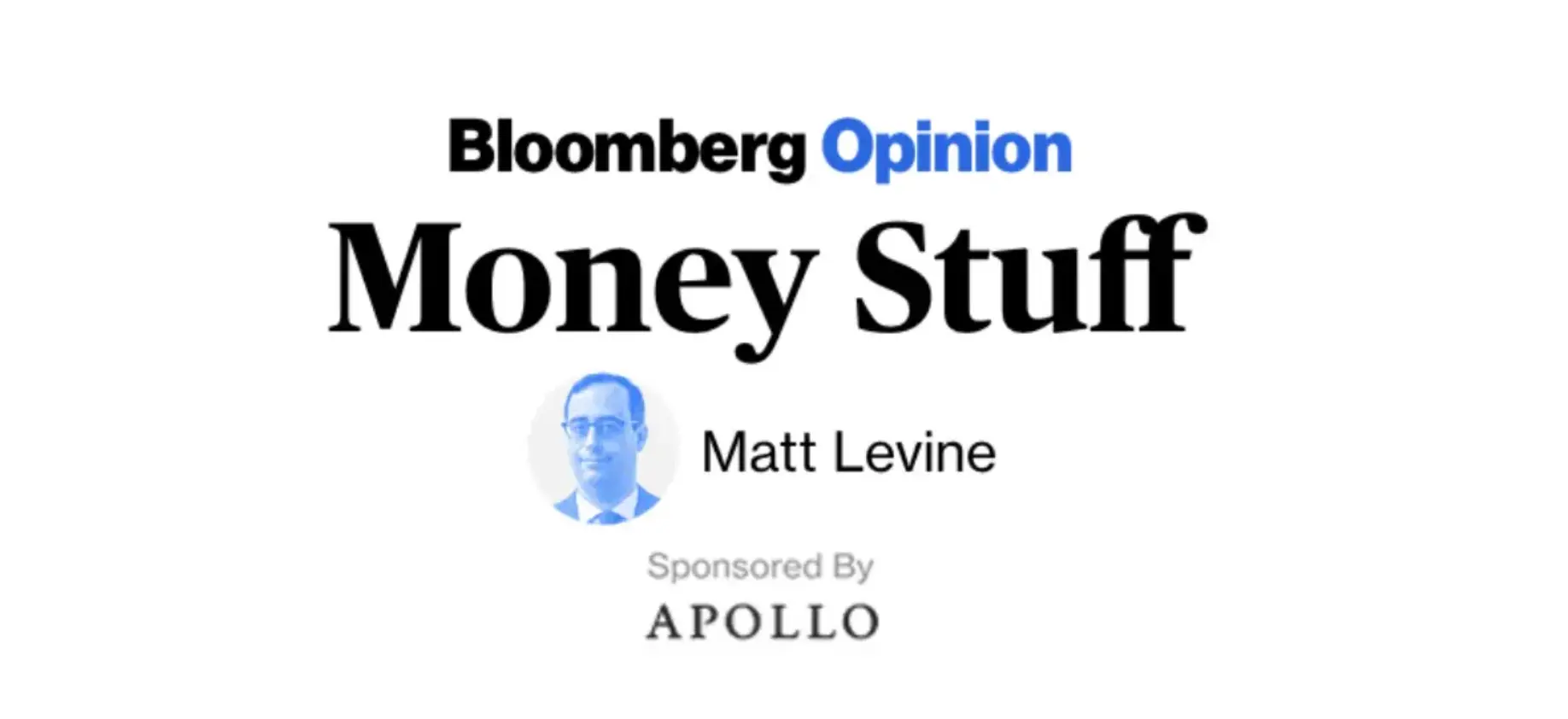Bloomberg's Chief Financial Writer: Crypto-related U.S. stock companies have an astonishing premium? What can retail investors do?
Original article "Put the Crypto in the Index Funds", compiled by Odaily Planet Daily jk.
Original author: Matt Levine is a Bloomberg Views columnist responsible for financial reporting, and has been ranked No. 1 in Bloomberg Finance Views for many years. He was previously an editor at Dealbreaker, served in the investment banking division of Goldman Sachs, served as an M&A attorney for Wachtell, Lipton, Rosen & Katz, and served as an associate judge in the U.S. Court of Appeals for the Third Circuit.

What is Vanguard's strategy?
The basic scenario today is that the U.S. stock market will buy $1 of cryptocurrency with a stock valuation of $2. If a small public company holds $100 million worth of crypto assets such as Bitcoin, Ethereum, and Trumpcoin, its market capitalization will rise to at least $200 million. This kind of trading can seem both confusing and magical. MicroStrategy (which now simply simplifies its name to "Strategy" and owns about $70 billion in Bitcoin and has a market capitalization of about $138 billion) started this game, and today, a variety of small companies are imitating and seemingly successful.
I often joke about this, but behind it is really worth asking: why is the stock market willing to pay $1 for $2 worth of cryptocurrency? This problem can be roughly divided into three explanations:
-
The bitcoins held by a business are worth more than you own. Because companies can use these crypto assets to do things you can't do, such as educating investors, lending, leveraging, staking, tokenization, in short, all kinds of "operations". From a business perspective, this premium is justified.
-
There is a lot of institutional capital that wants to buy Bitcoin, but they can't buy it, they can't hold it directly, and they can't hold it through more conventional (lower premium) methods such as futures, ETFs, etc. So they're willing to invest indirectly through these "crypto vault companies" at a premium. This premium comes from an imbalance in the market structure: these companies provide institutional investors with a form of "legal compliance" of investing.
-
Retail investors are lazy and confused, following the trend to buy these stocks with the "crypto vault" label, not realizing that they are buying a bunch of overvalued crypto assets. To put it simply, it is the "stalk effect".
Every company that does this will say the first reason - "we don't just hoard coins, we do a lot of things", but I always found that unconvincing. The third explanation – "Haha, retail investors" – sounds plausible, and I've written about it myself ("For many small U.S. stock companies, the most immediate attraction of the crypto vault strategy is that no one pays attention to us as a small company, but if we announce that we have bought a bunch of crypto, retail investors will get high and rush in and buy our shares at a high price. ”)
But what's really interesting is the second point. If this logic holds: "Big asset managers want crypto exposure, and Strategy is the only way they can easily buy it, so they're willing to pay a 100% premium to buy its shares," then ...... It sounds super weird, but maybe it's true? I looked up Strategy's shareholder list on Bloomberg, and the second largest shareholder is Capital Group, a traditional fund manager with a focus on active investing, with a 6.99% stake. Is it a good investment? Looking at the last 12 months, Strategy shares are up about 175%, while the S&P 500 is up only 13%. So...... Yes?
So why doesn't Capital just buy Bitcoin and buy Strategy twice as much? Maybe they want to buy, but can't: this part of Capital's holdings comes from its Growth Fund of America, which "invests primarily in common stocks" and "can invest in other types of equity securities," but obviously doesn't include Bitcoin or Bitcoin ETFs. If you're a long-term fund manager who only invests in stocks and you want to buy Bitcoin, then in the past year, (1) you're right, and (2) you can't buy it. So, buying Strategy may be the only option you can actually make.
(Should you be able to do that?) Is it time to amend the Fund's investment mandate? Are your customers paying you to buy Bitcoin for them? Is this what you should do? I don't know, but one thing is certain: you're not buying Bitcoin, you're buying Strategy's stock. )
Therefore, the high premium of Strategy stock may reflect the expectation that "institutional investors want to buy 'bitcoin in stock form', and the market supply cannot catch up." Another related, but slightly different, view is: "Index funds will passively buy Strategy, no matter how premium it is." Capital is the second largest shareholder, but according to Bloomberg's Vildana Hajric, the largest shareholder is actually Vanguard:
"Bitcoin is not for long-term investors. Digital assets are more speculation than investment. They are an 'immature asset class' with no clear history and no 'intrinsic economic value' that can wreak 'wreaking' on portfolios. ”
Vanguard executives have always been steadfast in the logic of founder Jack Bogle and critical of crypto assets. Ironically, according to the "cold logic" of passive investment by index funds, the giant with $10 trillion in assets under management is now the largest shareholder in Strategy – a software company that has turned itself into a "bitcoin shadow company".
Vanguard owns more than 20 million Strategy shares, representing nearly 8% of its Class A common stock, and may well have surpassed Capital Group in the fourth quarter of last year. According to Bloomberg, these holdings are spread across dozens of Vanguard's funds, covering a variety of index products such as small-cap, mid-cap, momentum, value, and growth.
And Strategy isn't even in the S&P 500 yet! ("Vanguard's largest holdings are its total market capitalization index fund, VITSX, which holds about 5.7 million shares worth about $2.6 billion.) But Strategy is working hard to make the cut. Think about how hilarious it would be if it did make it into the index.
And: What's wrong with that? I often joke about these things, but what do I know? Yesterday I just laughed at a newly launched "crypto vault company" with a reserve of assets in HYPE tokens. I wrote: "The name is too straightforward. "But I also often laugh at some of the ordinary listed companies, whose stock prices still go up sometimes. This article is not investment advice, and most of my money is in index funds. I've learned a lesson: I want to laugh at a financial phenomenon that has nothing to do with whether it will rise or not. I don't have much predictability, so I try to be a price taker – buy a market portfolio and accept market returns. Many investors should do the same, or do the same.
The "market mix" in 2005 was mostly stocks and bonds; In 2025, this will undoubtedly include cryptocurrencies as well. There are many ways to get exposure to crypto assets these days (you can buy Bitcoin directly, buy Bitcoin ETFs, etc.), and there will definitely be people who will email me about their startup projects that can help you easily gain exposure to crypto indices (for example, give them $100 and they will allocate a basket of crypto assets to you in a market capitalization-weighted way).
But the easiest and laziest way is to buy the entire US stock market index directly. Because the current stock market has been absorbing more and more "crypto vault companies". You may not want crypto assets in your stock index fund – and neither does Vanguard – but the essence of an index fund is to buy not what you want, but what the market wants to buy. (It's not what the fund manager wants to buy.) )
You don't believe that you (and you don't trust the fund manager) to pick the right thing, so you choose to trust the market. And now, what the market wants, is cryptocurrency.
